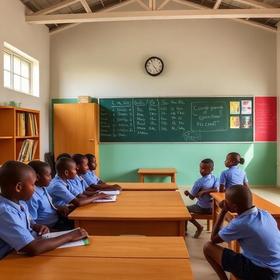5 Mistakes Parents Make When Choosing A Private School
Choosing the right private school for your child is a lengthy process. I want you to achieve the success that you deserve without making these common mistakes other parents have made.
1. Choosing a school that is not a good fit
You know your child better than anybody. Never forget that as you begin the processof choosing a school for your child. As you look at school websites, don't be distracted by those beautiful, professionally-produced presentations. Schools will show you what they want you to see. That's not a bad thing; however, those websites may not necessarily address your specific needs and requirements. Many times, while researching schools, you will receive false positives. It's hard not to be impressed by beautiful photos of a campus and its buildings, particularly if it is an older school with impressive grounds and architecture. But don't let cosmetics take your attention away from what is truly important, namely, the curriculum, the sports programs, and the extracurricular activities. Always ask yourself, "How does School X blend these three important components so my child will benefit from attending this school?"
As Geri Coleman Tucker wisely observes in 5 Mistakes Parents Make When Picking a School, "Sure, you want to pick a school that is clean and attractive, with all the newest technology. But remember that looks aren’t everything. Some schools might not have the latest and greatest equipment. But they have engaged and well-trained teachers who can bring out the best in their students—including those with learning and attention issues. The teachers are the most important element. Watch them interact with kids, and ask parents of current students for more insights."
Before looking seriously at schools, discuss your specific needs and requirements openly and honestly in a family conversation. Include your child in the discussion. Then, when you start gathering information about schools, you will have a list of features to look for. What you are doing is answering a simple question that has to be front and center at all times: "Is this school the best fit for my child?"
2. Not meeting deadlines
Most schools have admissions deadlines. The idea is to receive all the admissions applications by a specific date. Then, the admissions staff reviews all the applications and decides who to admit. They also decide who to reject and put on a waiting list. If you are applying to a school with a fixed deadline, always err on caution. Even with online applications, aim to submit all the information the school requires at least 10 days before the published deadline. Dr. Blythe Grossberg wisely points out: "Ideally, the school selection process starts in the summer or fall the year before your child will actually attend the school. By the end of the summer, you should've identified the schools you are interested in applying to, and you can start to arrange tours. "
Tied in with the admissions deadlines is scheduling the admissions test. While most standardized admissions tests are done electronically, schedule your child's test at least 2 months before the application deadline. You need to allow some margin for error. Sickness, weather, and other variables can make the test day a nightmare. Allowing yourself plenty of time to reschedule or schedule another test is a common sense approach to this component of the school selection process.
Parent Map suggests: "Plan to have your child take the test in the fall before your school applications are due. In the Seattle area, the last test date is often in January, and families typically want to begin preparing the spring or summer before. While you can schedule a December or January date to maximize your student’s time for test prep, you don’t want to sign up for the very last possible date, in case your child is ill at that time. Check the websites of the schools to which you want to apply to determine your student’s last possible test date."
3. Not visiting the school
You wouldn't buy a house sight unseen, would you? It's the same with the substantial financial outlay you are making for your child's education. Unless you live in another country, you must visit the schools on your short list of schools in which you are interested. Why? Because you can tell in a nano-second if the school you are visiting is a good fit for your child. Remember that you have researched carefully to understand what the school teaches and how it teaches. Seeing the campus, observing a class, and meeting teachers and staff will cement the deal. If you have questions, you can ask them during your visit. Our Kids has a list of twelve questions to ask schools. Incorporate these into your due diligence process for each school you visit.
4. Not asking for financial aid
Unless your last name is Gates or Bezos, you will probably want to consider asking for some financial aid. When you have one child in private school and another at college, you are looking at some serious money. Never assume that your family's financial picture precludes you from getting financial aid. You won't know until you ask. Speak to your financial adviser. Submit the PFS. One last word of advice: do not wait until the last minute. Noodle expert Brendan Mernin reviews the process of financial assistance in How to Get Financial Aid for Private School.
5. Not starting the school choice process far enough in advance.
I have always recommended that you start your school selection process as far in advance as you can. You are looking to devote up to 150 man-hours to this project. Devoting 2 or 3 hours to it consistently weekly will result in your controlling the process instead of the other way around. If you are a non-American person who is thinking of sending your child to an American boarding school, you will need to add in a few extra months for U.S. student visa formalities. Allow your child plenty of time to prepare for the SSAT, ISEE, TOEFL, and any other tests that schools may require.
Questions? Contact us on Facebook and Instagram. @privateschoolreview
#PrivateSchoolChoice #AdmissionsProcess #FinancialAid #SchoolVisits #DeadlineManagement #privateschools













